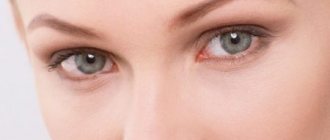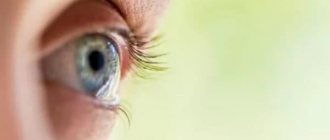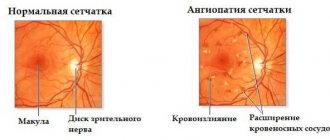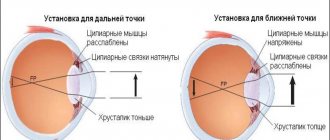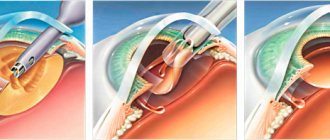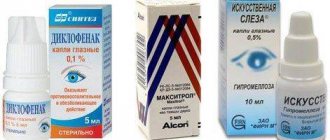Eyes hurt - as if they are pressing
The pressure with such eye pain is felt from inside the eyeballs, more in the head than in the eyes themselves. In this case, discomfort is felt when blinking, moving the pupils and head. Sometimes the frontal or occipital part hurts, and behind the eyes there is a feeling of heaviness and tension that cannot be relieved by anything.
The pain does not go away even when closing the eyes. Depending on the reason it is caused, it may be accompanied by additional symptoms: redness, itching, decreased vision, tearing.
Why is there pressure on the right and left eyes at the same time?
Pressing pain in the organs of vision can be caused by disorders of the visual apparatus. Then it is regular and is removed when the causes of the violations are eliminated.
Why does such pain occur in the eyes:
- One of the most likely causes of pressure on the eyes from the inside is glaucoma. Glaucoma is caused by increased intraocular pressure. This disease may not show symptoms for a long time, but at the same time it is very dangerous, as it leads to loss of vision. Bursting pain from the inside and squeezing pain in the eyeball, circles before the eyes, blurred vision are symptoms for which you should not postpone a visit to the ophthalmologist. People over 40 years of age and those with a family history of the disease are more susceptible to glaucoma. But even if you are not at risk, it is necessary to exclude the presence of this pathology.
- Uveitis is a disease in which the uvea of the eye becomes inflamed. This disease is characterized precisely by pressing pain from the inside, so when a symptom appears, it must be excluded. It leads to serious vision loss and even blindness.
- Incorrectly fitted glasses or contact lenses. Incorrect vision correction is the cause of excessive tension in the visual organ. Pressure inside the eye is often accompanied by fatigue and pain in the forehead and bridge of the nose. It is easy to get rid of the symptoms by simply eliminating the cause: removing glasses or contacts and allowing the visual system to rest for several days, and then choosing the correct glasses at the optician.
- Conjunctivitis is a disease characterized by inflammation of the outer mucous membrane of the eyeball (conjunctiva), which causes redness and sometimes pus.
- Disease of the trigeminal or optic nerve provokes severe pain and decreased visual acuity.
- Overfatigue is a common cause of discomfort in the organ of vision of various types. Visual stress includes reading in dim light, working at a computer for long periods of time, driving for several hours or in front of the TV without a break, when concentration causes a person to blink less often. In this case, the compressive pain is accompanied by dryness and a feeling of sand in the eyes, sometimes itching and redness.
Pathological causes
Ophthalmic pathologies cause pain on the left side.
These include:
- Weakening of the eye muscles. Long-term work at the monitor, overstrain of the visual organs lead to pain. Additionally, a feeling of the presence of foreign particles, lacrimation and pain develops.
- Increased intraocular pressure. Symptoms appear against the background of the development of glaucoma. Elderly people are susceptible to surges in intraocular pressure.
- Eye injury. Left-sided pain develops regardless of the degree of damage. If the integrity of the visual apparatus is damaged, hospitalization and consultation with a specialist are necessary.
- Infectious lesion. The pain provokes the development of pathogenic microflora in the left eye. Infection spreads to the eyelid, conjunctiva, cornea or sclera. To eliminate the pathological process, consultation with a specialist is necessary.
Causes of pressure on the forehead from the inside
Often, when there are unpleasant sensations in the visual organ, the head also hurts, especially the frontal part.
In this case, eye pain may be associated with disorders of the brain:
- Migraine is a neurological disease, known to many for its severe painful attacks. A headache can affect only the right or left side of the head, and, accordingly, only the right or left eye. With a migraine, only the forehead or the back of the head often hurts.
- Spasm of cerebral vessels caused by insufficient oxygen, chronic fatigue, lack of sleep, even smoking. Spasm occurs as a result of a sharp narrowing of blood vessels and leads to pressing sensations in the visual organ.
- Intracranial pressure, at which fluid accumulates in the ventricle of the brain. Head injury, tumor and other brain pathologies provoke increased intracranial pressure. The pain is shooting and sharp, felt as an increase in eye pressure.
- A hematoma inside the skull occurs as a result of head trauma and requires urgent treatment.
- In addition to ocular and severe headaches, brain sarcoma causes dizziness, nausea and vomiting, and sometimes decreased peripheral vision.
https://medglaza.ru/zabolevaniya/problema/bolyat-budto-davyat.html
Causes of heaviness in the eyes
- Eye diseases - myopia (myopia), hypermetropia (farsightedness), strabismus, astigmatism, glaucoma, optic neuritis, iridocyclitis, keratitis, conjunctivitis, dry eye syndrome.
- General diseases with severe intoxication, metabolic disorders and pathology of the endocrine system.
- ARVI, other infections.
- Allergic conditions and diseases.
- Neurological and vascular diseases (migraine, neurocirculatory dystonia or VSD, arterial hypertension).
- Exposure to UV radiation (walking without sunglasses, watching a UV lamp or welding machine).
- Physiological causes - eye fatigue as a result of working on a computer, optical equipment, driving a car, prolonged observation of closely located objects, processes, poor lighting, prolonged reading, wearing lenses, watching 3D films or other increased stress on the visual organs.
- Age-related changes in the eyes, stressful situations.
What pathologies can a feeling of pressure indicate?
In addition to diseases of the head and visual apparatus, there are other diseases that cause similar pain:
- Sinusitis. Inflammation and swelling of the mucous membrane of the maxillary sinuses provokes pain in the forehead and eye sockets. The infection can spread to the eyes and cause conjunctivitis, so bacterial diseases of the nasal passages should be treated.
- Frontal sinusitis and other types of sinusitis. The pain subsides after emptying the sinuses or after using vasoconstrictor drugs.
- Meningitis, encephalitis are inflammatory diseases of the brain. Intense, unremitting headache and eye pain is accompanied by fever.
- Flu. Fever, weakness, lethargy, chills, muscle pain - in the case of these additional symptoms, pressure in the eyeballs is understandable. It is accompanied by painful sensations from bright light, from any eye movement.
- Osteochondrosis of the cervical spine. At the same time, vision often deteriorates, the image blurs, spots and spots appear before the eyes.
- Diabetes.
- Vegetative-vascular dystonia (VSD).
- High blood pressure. When pressure in the eyes increases with coughing and sneezing, this may indicate a pre-stroke condition. You need to call an ambulance immediately.
Useful video
Pain in the left eye is caused by physiological and pathological reasons. To eliminate physiological disorders, it is recommended to adhere to a healthy lifestyle and prevent chronic diseases. Pathologies of the ocular apparatus require careful diagnosis and selection of individual therapy. To prevent the development of complications due to diseases, it is necessary to promptly consult an ophthalmologist, regardless of the presence of symptoms.
Author's rating
Author of the article
Alexandrova O.M.
Articles written
2031
about the author
Was the article helpful?
Rate the material on a five-point scale!
( 4 ratings, average: 5.00 out of 5)
If you have any questions or want to share your opinion or experience, write a comment below.
What to do if your head also hurts
What to do if your eyes hurt as if they are pressing? If you feel unpleasant pressure in the organ of vision, first of all, you need to identify the cause, which only a qualified doctor can do, who will conduct a comprehensive examination and make a diagnosis.
To rule out dangerous diseases, the specialist will measure intraocular pressure. If necessary, biomicroscopy will be performed.
This non-contact diagnostic method allows you to study the anterior and posterior parts of the eyeball. Biomicroscopy is painless and is performed using an ophthalmological microscope.
If the doctor identifies infectious diseases of the eyeballs, he will prescribe appropriate treatment with local medications.
Antibacterial drops and ointments will help cope with the problem and relieve unpleasant symptoms. If glaucoma is confirmed, serious intervention may be needed.
But there are also drops that can lower intraocular pressure:
- Azopt has many side effects, so only a doctor prescribes the dosage.
- Trusopt relieves symptoms of glaucoma and normalizes the production of intraocular moisture.
- Travatan is also used for preventive purposes.
- Timolol increases the outflow of eye fluid.
- Betoptik reduces intraocular pressure and lasts for 24 hours.
If the ophthalmologist does not find the cause of the unpleasant symptoms, he will refer you to other specialists for examination. Identified vegetative-vascular dystonia, diabetes mellitus, osteochondrosis and other pathologies require appropriate treatment with special medications and vitamin-mineral complexes.
If pressing pain is observed against the background of a flu-like state, then most likely it is associated with it. In this case, you need to focus all your efforts on recovery: drink hot drinks and rest, take medications prescribed by your doctor, and be sure to complete your treatment.
How to behave correctly?
First of all, inspect it for damage, hemorrhages, and foreign bodies. If you notice an injury, seek medical attention. If there is no visible damage, you can rinse your vision with special solutions (such as artificial tears) or clean water.
If you have chronic diseases, for example, arterial hypertension, measure your blood pressure; you may need to take your usual medications to lower it. The same applies to attacks of glaucoma and migraines.
Periodically give your eyes a rest, do special relaxing exercises and self-massage. A cool compress or tea lotions may also help.
In any case, if the pain is intense, accompanied by blurred vision, or remains for a long time, you should visit a doctor to rule out a serious pathology and receive recommendations for treatment.
If pressure and pain in the eyes occur due to overwork, wearing lenses or poorly chosen glasses, eliminate the influence of irritating factors. Relax in a dark, cool room. To restore eye tone, you can perform therapeutic ophthalmic exercises.
Eye exercises:
- Move your eyes up and down 6 times, close your eyes and repeat this exercise.
- Without moving your head, look left and right 6-8 times, then repeat the exercise with your eyes closed.
- Starting from the upper right corner of the room, draw an imaginary circle with your eyes, then in the middle of the room - a circle, a triangle.
- Repeat with your eyes closed.
- Draw a figure eight, an infinity sign, open and closed eyes with your eyes.
- Perform the exercises while standing or sitting without moving your head. It is recommended to perform the complex daily.
If cephalalgia occurs along with pain and pressure in the eyes, take a painkiller - Analgin, Tempalgin, No-shpu, Nise or another.
If pressure and pain in the eyes occur frequently, or are accompanied by other symptoms, consult your doctor immediately.
You will be prescribed diagnostic procedures, based on the results of which a specialist will determine the cause of the pain and prescribe adequate treatment.
What can't you do?
Do not use painkillers for 2-3 days in a row. Never use ophthalmic drops or other medications to treat eye diseases without a doctor’s prescription.
If pressure and pain in the eyes are accompanied by visual disturbances and short-term loss of vision, do not drive a car or operate vehicles and devices that require increased concentration.
Do not try to determine the cause of eye pain at home and do not self-medicate. After determining the diagnosis and prescribing therapy by your doctor, strictly follow the recommendations and dosages of taking medications.
Remember:
- Pressure and pain in the eyes occur due to visual fatigue, migraines, increased intracranial pressure, ENT diseases and other pathologies.
- Unpleasant symptoms can also appear when wearing contact lenses and poorly chosen glasses.
- To eliminate pain due to overwork, eliminate irritants and rest, perform eye exercises.
- If you experience frequent eye pain or develop additional symptoms, consult your doctor.
- Do not self-medicate.
Treatment of high eye pressure If you complain that your eyes hurt, there is pressure on the eyes from the inside, then you need to consult an ophthalmologist. Treatment of eye pressure should begin with identifying and eliminating the causes of complaints.
The second stage of treatment for high eye pressure is drops. If the cause is computer vision syndrome, then moisturizing drops and vitamins are prescribed. It is recommended to do eye exercises daily. Inflammatory eye diseases are treated with antibacterial agents.
To reduce eye pressure, avoid using TV and computers, rest as much as possible, walk in the fresh air, do not engage in work that requires significant eye strain, and give up strength sports.
In some cases, surgery is necessary to normalize eye pressure. Two types of operations are performed: excision of the iris with a laser and stretching of the trabecula with a laser. As a result, there is a natural outflow of excess secretion products from the eyes.
Treatment with traditional methods
To relieve tension and excessive pain from the organ of vision, you can turn to traditional medicine.
What to do if there is pressing pain in the eyeballs, ancient recipes will tell you:
- Finely chop the aloe leaf or grind in a blender until mushy. Pour a glass of boiling water over it, add a tablespoon of chicory juice and leave the resulting mixture to steep for 4 hours. Strain through cheesecloth or a fine sieve. Use a cotton swab soaked in the solution to wipe your eyes 3 times a day.
- Leave valerian root in a water bath for 1.5 hours. Drink 3 times a day before meals for 7 days.
- Apply a compress of grated fresh potatoes to the forehead and eyes for 10-15 minutes.
- Add a teaspoon of apple cider vinegar to the pulp of medium potatoes and leave the resulting mass for 30 minutes. This compress will easily relieve eye pressure.
- Mix dry hawthorn and yarrow herbs in equal quantities. Pour boiling water in a ratio of 5 tbsp. spoons of herbs per 500 ml of water. Leave in a water bath for 15 minutes, then leave to cool for an hour. Drink a glass of herbal tea three times a day.
- Place a cabbage leaf on your eyes and forehead.
- Mix 1 teaspoon of lily of the valley flowers with 0.5 cup of dry nettle, pour a glass of boiling water. Place in a dark place to infuse for 12 hours. Then wipe your eyes with a cotton pad soaked in the solution.
- Pour boiling water over 20 grams of dry eyebright and let it brew for an hour. Soak cotton pads in the solution and apply compresses to the eyes 2 times a day.
- Squeeze juice from fresh celandine and mix it with liquid honey in equal proportions. Cook in a water bath until the mixture thickens. Use as a compress - the product relieves intraocular pressure.
There are many different recipes. The main thing to remember is that it is not recommended to instill non-sterile solutions into the eyes.
In addition to ancient methods of dealing with pain, you can resort to aromatherapy. Lemon, orange, juniper, mint essential oils can alleviate the condition.
However, aromatherapy has its contraindications, and you should consult your doctor before using it. In addition, you should use this remedy only if you are sure of the cause of the pain.
The dangers of no treatment
If you attribute the pressing pain to fatigue and do not ask yourself why it bothers you, this can lead to detrimental consequences. The reasons that can cause such pain may not be harmless, but even dangerous.
Glaucoma leads to severe vision loss and even blindness. Other eye pathologies also lead to vision loss in the absence of timely and qualified treatment. High blood pressure can cause a stroke.
Brain sarcoma is a deadly disease. Hematoma, inflammatory diseases of the brain, and increased intracranial pressure also pose a danger not only to health, but also a threat to life.
In case of pathologies of the nasopharynx of an infectious nature, you should consult an otolaryngologist. Such diseases cannot be neglected, as they spread to the organs of hearing and vision, and can cause brain diseases.
Diagnostic features
If you have a headache that spreads to the area of your right eye, you need to see a doctor for a diagnosis. To do this, an analysis of the patient's medical history is carried out.
At the doctor
The doctor may also prescribe additional procedures:
- hormone analysis;
- electrocardiogram;
- computed tomography of the brain;
- MRI;
- general blood analysis.
Magnetic resonance imaging
It is important to carry out diagnosis in a timely manner, since many patients, in order to get rid of painful sensations, take painkillers, the active components of which can hide the symptoms of dangerous pathologies
Prevention of this problem
It is much easier to prevent a disease than to treat it later - this also applies to such an unpleasant symptom as pressure in the organ of vision and in the frontal part of the head.
To prevent it, follow these recommendations:
- limit the time spent on the computer and other gadgets;
- choose the right glasses and contact lenses;
- measure your blood pressure regularly;
- undergo preventive examinations with an ophthalmologist;
- treat sinusitis and other bacterial infections;
- take courses of vitamins, especially in the spring, when their deficiency affects all systems of the body;
- Perform eye exercises every time your organ of vision is under prolonged stress.


